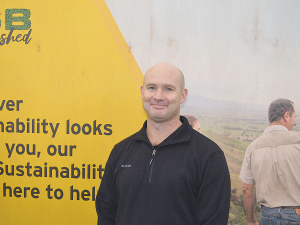Two new awards open to help young farmers progress to farm ownership
Entries have opened for two awards in the New Zealand Dairy Industry Awards (NZDIA) programme, aimed at helping young farmers progress to farm ownership.
 ASB rural general manager Ben Speedy says most farmers are happy with how the dairy industry is faring.
ASB rural general manager Ben Speedy says most farmers are happy with how the dairy industry is faring.
"Content without being confident" is how ASB rural general manager Ben Speedy described the mood among dairy farmers at this month's National Fieldays.
Speedy told Dairy News that most farmers are happy with how the dairy industry is faring.
"They are enjoying high commodity prices and are using fair returns to pay down debt," he says. "But there are definitely concerns around looming environmental regulations and labour shortages on the farm."
Speedy says most farmers understand the impact of climate change. They acknowledge the need to invest and make farming more efficient.
"There were a lot of conversations around learning and investing in farming to make it lot simpler. They only want to invest once."
Speedy says farmers also understand that shoppers are increasingly choosing products which meet their personal and environmental values. "Farmers know they have to make investments to improve their environmental footprint."
During Fieldays, ASB announced a new rural sustainability loan offering a 2.25% p.a. variable rate for sustainable farming invest once."
Speedy says ASB rural customers can now tap into discounted lending to take their farm sustainability to the next level, with funding available for conservation and biodiversity restoration, and projects to drive the switch to renewable energy, prevent pollution and waste, cut emissions, and promote healthy soil, ecosystems, waterways and animal welfare.
ASB executive general manager for business banking Tim Deane says the rural sustainability loan will help future-proof two of New Zealand's greatest assets - our farmers and our land.
"Farmers tell us climate change and regulatory pressure are big issues keeping them up at night. That's why we're digging in and doing more for Kiwis who want to go beyond compliance basics and drive change that makes a deeper difference for their farm and ultimately the environment.
"Already our farming customers have invested more than $120 million to plant native trees, install environmentally-friendly effluent systems and fence off waterways - and we know many want to do more. Our goal is for our new sustainability loans to back $100 million in green upgrades over the next five years, so New Zealand can continue to lead the world in efficient and profitable farming and command a premium for Kiwi products."
Applications for ASB's rural sustainability loan are now open and the variable rate will be available for up to five years from whent the customer makes their first draw down. The variable rate means customers are free to make lump sum payments or fix their rate at any time.
"Climate change is a critical issue for New Zealand. And whether it's navigating shifting consumer expectations, or the reality of changing weather conditions on their farm, we know ASB has an opportunity to help our customers get ahead of their sustainability challenges.
"We're proud of the work many farmers have already done and are excited to be offering this sharp rate to encourage more to get stuck into meaningful environmental improvements. From solar power for the milk shed, precision fertilisation or changing pasture or herd genetics to reduce methane emissiions, there's so much we can do to make a real difference for farmers while supporting a more sustainable rural sector in the longer term," says Deane.
Could a breakthrough in fermentation create a new multi-million-dollar export market for shiitake mushroom extracts into China?
Meadow Fresh has created the world's first fantasy sports league powered by real cows.
This year, 'Foodie February' sees potatoes take the spotlight as one of New Zealand's most powerful and versatile food heroes.
A multi-cultural team is helping to establish one of New Zealand's largest plantings of premium eating grapes - while learning each other's languages and cultures along the way.
The World Wide Sires National All Day Breeds Best Youth Camp Best All Rounder plaudit has become family affair, with 2026 Paramount Cup winner Holly Williams following in her sister Zara's footsteps.
DairyNZ is giving New Zealand farmers a unique opportunity to gain hands-on governance and leadership experience within the dairy sector.
OPINION: Fonterra may be on the verge of selling its consumer business in New Zealand, but the co-operative is not…
OPINION: What does the birth rate in China have to do with stock trading? Just ask a2 Milk Company.